CIA Sponsored Terror, Civil Liberties, Criminalizing Dissent, Habeas Corpus, Human Rights, Political Prisoner, Prison Industry, Surveillance, Torture
Podcast: Play in new window | Download
Updates:
—

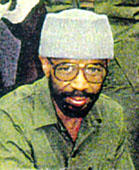
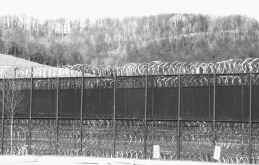
Campaign To Release Russell Shoatz From Solitary Confinement Into General Population
Last year, the National Lawyers Guild called on Superintendent Louis Folino to support the Program Review Board’s recommendation to release Russell Maroon Shoatz into the general prison population at SCI Greene in Waynesburg, Pennsylvania. As many listeners may know, Russell Maroon Shoatz has been held as a political prisoner under intense lockdown spending no more than one hour a day outside of his cell for the past 21 of those years. He was locked up in 1972 for his activity as a member of the Black Liberation Army. We follow up on the international campaign to release Shoatz. The effort was launched in New York City and London and sponsored by the Scientific Soul Sessions.
Theresa Shoatz:
- He goes before the Program Review Board every 90 days, its about 68 visits since he’s been in solitary confinement. He hasn’t had any infractions in 30 years.
- If you look at that, they don’t intend to release him into general population.
- It’s a check-off, how has response been around the guards? What’s your response when you’re taken to the shower?
- Russell had become disappointed with the Program Review Committee and said “I’m not going anymore.”
- I called the Program Review Committee at SCI Greene, and said we’re getting tired of this no-movement forward.
- They said they look down on that as not cooperating with the prison. We look at as they’re not cooperating with all the rules they set forth. There is a step down program, they don’t use it as much as they should.
- When you talk about holding one person in solitary confinement, he has to be transferred, whatever his movement, to the shower, to the one hour cage, it takes two guards.
- SCI Greene released at least 20 prisoners from solitary confinement who they had no intention of releasing but because the state budget is in jeopardy now.
- They left Daddy back there. Daddy’s approaching 70 years of age, he hasn’t had an infraction in 30 years, you would’ve thought he’d be the perfect person for this step down program, and we questioned that.
- When I talk to the staff in solitary confinement, they all say he needs to be general population.
- Superintendent Folino retires in 2 years and I think he may want to slide out without releasing him into population.
- Russell escaped in 1977, in the 80s, he was in population at SCI Pittsburgh.
- He had been voted the first black president of the Lifers Association.
- Folino states that he is a leader and he is to remain in solitary. The director of the Program Review Committee actually stated that he is a leader. Obviously Theresa, you don’t know he’s a leader?
- Outside of him being a leader, he’s been able to withstand this 23 hour a day lockdown.
- I do see there are some changes with Russell. I’m talking emotionally, he’s very distraught now.
- I’m shocked that he hasn’t totally broken down.
- He gets a lot of mail. He’s busy with letter writing.
- I found there have been a lot of suicides in SCI Greene’s solitary confinement unit. Boys in their twenties hanging themselves. You don’t hear about it.
- This is torture. In 2005, there were 80 thousand people in solitary confinement.
- Juan Mendez’s report on Russell Maroon Shoatz
- My focus is on getting Maroon into population. I’m concerned with stopping the expansion of prisons being built. It costs millions of dollars to build new prisons, instead of using that for education for prisoners being released.
- Put that money back into public schools instead of building new prisons.
- We’re being assaulted by this present day prison system and our government nor our state seems to mind locking up folks or taking away money from our public school education and putting it into prisons.
- Congressional Hearing on Solitary Confinement
- hrcoalition.org / Russell Maroon Shoatz
Guest – Theresa Shoatz, a Philadelphia-based prison justice activist and the daughter of Russell Shoatz.
—–

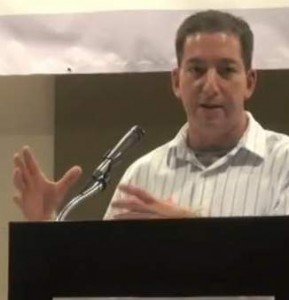
Glenn Greenwald: Challenging the Surveillance State, Breeding Conformists
Glenn Greenwald, author and contributor (columnist and blogger) to Salon.com. During his book tour for the release of With Liberty and Justice for Some, (paper back release) he gave a impactful speech in Chicago titled Challenging the Surveillance State.
—————————————
Civil Liberties, Habeas Corpus, Human Rights, Prison Industry, Surveillance, Truth to Power
Podcast: Play in new window | Download
Updates:
- Federal Appeals Court Revives Lawsuit Brought By Two Iraqi Detainees
- Palestinian Prisoner Hunger Strike Update
—–
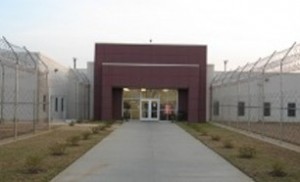

ACLU of Georgia to Release Report on Immigration Detention in Georgia
A report released by the American Civil Liberties Union Foundation of Georgia exposes the privatized corporate immigrant detention facilities in that state. The report contains interviews from more than 60 individuals detained inside four different detention centers.
Guest – Azadeh Shahshahani, the National Security/Immigrants’ Rights Project Director with the Georgia ACLU.
—–

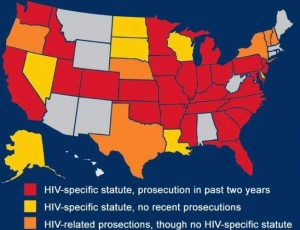
HIV Specific Criminal Laws
We talk today about HIV-specific criminal laws and sentence enhancement. HIV criminal prosecution of occurs when an HIV-positive individual does not disclose their HIV status to a partner before engaging in sex. The person charged may face decades in prison, life time registration as a sex offender and stigmatization. While there have been hundreds of prosecutions for HIV crimes in the United States, disclosure and consent is a defense but is difficult to prove and actual transmission of HIV is unnecessary.
Sean Strub:
- About 35 states and territories have HIV specific statutes that only apply to people with HIV that mandate disclosure of their HIV status prior to engaging in intimate contact with another person, independent of whether there is any risk present, independent of whether there is any harm incurred and independent of any intent.
- The statutes have created a viral underclass that is pretty concerning. Right now there’s an explosion of laws based on people’s viral status.
- The vast majority of the prosecutions do not involve the transmission of the virus.
- There are also a number of HIV prosecutions that fall within the phenomenon we call HIV criminalization that aren’t about sex but are heightened charges for other behaviors.
- Willie Campbell in Texas is serving 35 years for spitting on a cop because the court found his saliva to be a deadly weapon even though saliva doesn’t transmit HIV.
- We’ve been alerting people to the fact that this horrific public health policy, that increasingly you hear, take the test, risk arrest.
- The best defense (under the current laws) for not getting prosecuted for HIV criminalization is not getting tested. Not knowing your status in the first place.
- A man in Iowa just had a 50 year sentence upheld. These forms are driving the criminalization specifically as well as contributing to the stigmatization that makes people reluctant to get tested, reluctant to disclose.
- These states that HIV specific statutes, they don’t have specific statutes for hepatitis or HPV. Four thousand women last died from cervical cancer, almost every single one of them got it from Human Papilla Virus. HPV – genital warts.
- But we’re not out prosecuting people for HPV.
- The answer is obvious those sexually transmitted diseases aren’t associated with an outlaw sexuality. They’re not associated with people of color or gay men, with anal intercourse or people who use drugs.
- Poz Magazine The SERO Project
Guest – Sean Strub, writer and activist who founded several magazines and websites, including POZ magazine and POZ en Español, (for people impacted by HIV/AIDS), Mamm (for women impacted by breast cancer), He is the founder of the SERO project to help oppose the use of HIV specific criminal laws.
—–
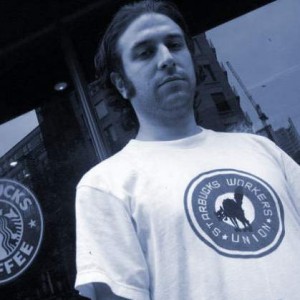
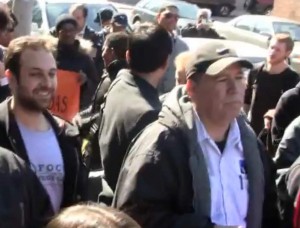
Lawyers You’ll Like: Attorney Daniel Gross – Focus On the Food Chain Victory
Victories continue for Brandworkers, a non-profit organization protecting and advancing the rights of retail and food employees. Last fall we talked with Attorney Daniel Gross, Executive Director of Brandworkers about the 470 thousand dollar settlement reached in a labor dispute with Pur Pac, a food distribution warehouse giant that illegally withheld wages from their workers. Today we discuss the latest victory in another settlement recovering nearly 600 thousand dollars in unpaid wages and compensation for workers at Flaum Appetizing. According to Daniel Gross, the Latino workers there were subjected to constant verbal harassment and forced to work at unsafe speeds.
Attorney Daniel Gross:
- New York City economy has a burgeoning food processing and distributing sector. There are 35 thousand workers, the vast majority are immigrant workers of color.
- The vast majority depend on this sector for their livelihood.
- The business model is simple. It’s exploiting recent immigrant workers of color through wage theft, through reckless disregard of health and safety and egregious discrimination of workers from Latin America, China, Haiti, Nepal.
- Flaum Appetizing , regrettably but not surprisingly really fit the mold. Flaum is a hummus manufacturer and distributor of kosher food products based in East Williamsburg, Brooklyn.
- It starts the sector of the food corridor of food manufacturing and sweatshops.
- Flaum Appetizing engaged in a tremendous amount of wage theft, a failure to pay overtime and in some cases, minimum wage.
- Millions and millions of dollars of real wealth had been illegally withheld from workers.
- There was offensive and insulting discrimination against Latino workers including Latino workers being called cockroaches and aliens.
- The Flaum Appetizing workers approached me in 2010 with some hope and energy because they had seen the victories of our members at the Wild Edibles Seafood had won.
- The workers through incredibly persistent grassroots energy persuaded over 120 of the best most prominent grocery stores in New York to stop selling Flaum products including their Sunny and Joe’s Hummus until workers’ rights were respected.
- Our commitment with Brandworkers, if fight to win. When we engage with an adversary, they should know if we have to, we will chase them to the gates of hell and back.
- Almost all of our members in the Flaum campaign are raising young children.
- There were two components we were able to bring home which was really a hard fought struggle.
- One was our members were proud to report they recovered 577 thousand dollars in wealth that will help them transform their families lives both here and in their home countries, Mexico and El Salvador.
- They also one a binding code of conduct which will force Flaum Appetizing into full compliance of workplace protections.
- Our model is the labor movement of the late 19th century. Unions like Local 8, the great IWW on the Philadelphia docks that used worker direct action and everyday solidarity.
- Unions and worker centers and community groups are going to converge at the New School on June 6, 2012. Food Justice Movement Food Chain Workers
- I owe my politicization to a company that’s now bankrupt. That was Borders Books and Music.
- I come out of working in retail and fast food and Starbucks as you mentioned.
- My grandfather was a member of the teamsters union. He drove a liquor truck out of the Bronx. So I knew in the back of my mind he was able to live the last years of his life as amazing grandfather with dignity because he had his union pension.
- Fighting Starbucks honed my skills because they are such a sophisticated and determined adversary.
- The evil brilliance of the Starbucks union busting operation.
- I had the unique pleasure which I will remember all my life to be represented by Leonard Weinglass.
Guest – Attorney Daniel Gross, Executive Director of Brandworkers, a non-profit organization protecting and advancing the rights of retail and food employees.
————————————————————
CIA Sponsored Terror, Civil Liberties, Criminalizing Dissent, FBI Intrusion, Human Rights, Political Prisoner, Prison Industry, Surveillance, Truth to Power
Podcast: Play in new window | Download
Updates:
——
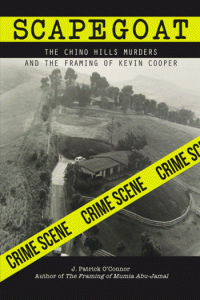
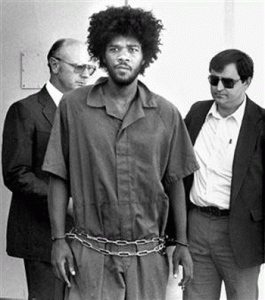
Scapegoat: The Chino Hills Murders and The Framing of Kevin Cooper
Scapegoat: The Chino Hills Murders and The Framing of Kevin Cooper is the title of Patrick O’Connor’s new book. This is an important document chronicling Kevin Cooper’s controversial conviction and death sentence in 1985. When O’Connor committed to writing the book, he poured over thousands of case documents from trial transcripts, grisly autopsy photos, appeals and judicial rulings. He then began interviewing those involved in the trial and appeals. The picture began to take shape, a familiar one. The prosecution and the police withheld and destroyed evidence that would have exonerated Kevin Cooper from the brutal murders of the Ryen Family and their guest.
J. Patrick O’Connor:
- In 2008, the Mumia book that I wrote was coming out and I was in the San Francisco Bay area with (attorney) Jeff Mackler of the Mobilization to Free Mumia.
- We had about 15 venues that we went to all over the bay area. Invariably, supporters of Kevin Cooper would come to these events and afterwards would take me aside and say you got to write a book about Kevin Cooper.
- His case is a lot different than Mumia’s but there are a lot of similarities.
- Once I started reading the transcripts of this trial, I could see there were a lot of things wrong with this case.
- It took me about 2 and half years from the start to the publication of the book.
- There was a terrible, in Chino Hills, this is Arabian horse country. This family named the Ryens, they live on a hilltop house with a very big spread, about 15 Arabians. San Bernadino-45 miles east of Los Angeles.
- In this area, most of the people were either raising horses or grazing cattle. This family was a mom and dad and they were both chiropractors. 41 year old chiropractors, and they had a 10 year old daughter named Jessica and an 8 and a half year old son named Josh.
- A friend of Josh’s 11 year old Christopher Hughs, spent the night.
- Around midnight that night, the home was breached. The master bedroom. The family was assaulted with an axe, or a hatchet, I think 2 knives, and an ice pick.
- It was an incredible fight, these people didn’t stand in line and say I’m next.
- The father Doug was 6’1″ 190lbs, a former Marine, an MP in the Marines and could take care of himself. The mother 5’8″ very strong, she was the one that could train the horses, these enormous horses that she could control.
- Both of them kept loaded weapons in the bedroom. The idea that one perpetrator could use 4 weapons to perpetrate this attack is kind of fecitious on its face.
- What put Kevin Cooper in the crosshairs is 3 miles from Chino Hills is Chino which is home to the California Institute for Men, where every felon in Southern California is sent for classification.
- Cooper was sent there for 2 burglaries in LA. Escapes and holes up in Chino Hills for the next 2 days, in a house located 125 yards from the Ryen’s house.
- Josh who had survived, told the deputy sheriff through a hand squeeze method that it was 3 white men. They put out APBs for 3 white guys.
- When they discern Kevin Cooper’s prints are all over that hide out house, they discard that information and start planning evidence that would implicate Cooper and making big lies about stuff that would implicate him.
- He would have been the only African-American in the community.
- They contaminated the crime scene, there are 2 bathrooms in this house, the cops used one of the bathrooms that had blood in the sink.
- They don’t type the blood properly, they put blood from all different parts of the room in the same bag.
- So, there’s no way to track the motions of who died, what was the order of death?
- They took the walls out, they carted out all the furniture, put it on the front yard. Then they moved it to a warehouse where the air conditioner broke. It went to 120 degrees, they lose all the blood evidence in the warehouse.
- The night of the murders, Cooper left after 9pm to hitchhike to Mexico. Cooper sees his mugshot on TV, he goes on the lamb. Cooper is got and convicted, he gets the gas chamber.
- He came with 3 hours and 45 minutes of being executed because of a moratorium. Kevin Cooper is fifth in line, this moratorium will end in 2013.
- They had to have the complicity of numerous people inside the sheriff’s department and a very willing DA’s office to perpetrate this fraud on Cooper.
Guest – J.Patrick O’Connor, editor of Crimemagazine.com and the author of The Framing of Mumia Abu-Jamal (2008). He has previously worked as a reporter for UPI, editor of Cincinnati Magazine, associate editor of TV Guide, and editor and publisher of the Kansas City New Times.
——–
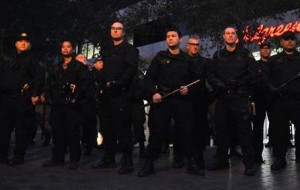

Homeland Security Documents Show Massive Nationwide Monitoring of Occupy Movement
Last month we gave Mara Verheyden-Hilliard and Carl Messinio of the Partnership for Civil Justice the Law and Disorder Tip Of The Hat Award for creative use of FOIA. The documents obtained by the Department of Homeland Security show a massive nationwide monitoring, surveillance and information sharing between DHS and local authorities. But its only the tip of the iceberg. The documents are heavily redacted and don’t show the full scale of coordination. “These documents show not only intense government monitoring and coordination in response to the Occupy Movement, but reveal a glimpse into the interior of a vast, tentacled, national intelligence and domestic spying network that the U.S. government operates against its own people,” says Mara Verheyden-Hilliard, she’s the Executive Director of the PCJF.
Attorney Mara Verheyden-Hilliard:
- We filed a series of FOIA requests and demands in November of last year when it was clear the Occupy movement was being subjected to a coordinated assault.
- We wanted to expose and uncover the role of the federal government working hand in hand with local police and municipalities to shut down this movement. A movement that is inspiring people all over the country and is a force for social change.
- What we have is the tip of a very carefully submerged iceberg.
- What we’ve seen is massive surveillance, coordination, monitoring of peaceful protesters all over the country by the federal government.
- There is monitoring that’s gone on from Washington DC, to Atlanta, to Detroit, to Dallas, that there is an intense focus going all the way up to high ranking members of the administration.
- We know that with the creation of the fusion centers and the suspicious reporting activity, the vertical integration of law enforcement and intelligence operatives in the US, that coming from a federal level, from the Department of Homeland Security, with billions of dollars. There is in place where all of the hundreds and thousands of law enforcement officers . . local is almost deputized, where they’re collecting information and feeding data.
- It’s critical that the people of the United States see this. The way for this to be stopped is to uncover it and expose it. We see time and again the FBI creating its own terrorist plots, in many times as PR to justify their oppressive apparatus.
- One of the defining features of the Obama Administration is the fact that it took on this apparatus put in place by the Bush Administration and not only didn’t take it apart, they have deepened it.
- There is really a structure now in the United States that has the US government spying and collecting data on its own citizens.
- We have regulation that has been put into place under the Obama Administration where there is growing use of military support for domestic civilian authorities which is very concerning.
- We can see that the real spark for social change is people getting together for collective action.
- What we want to accomplish is to keep the streets, sidewalks and parkland open for grassroots democracy and social change and people need the ability to come out and come together and in order to do that without fear that they’re going to be beaten . . or mass arrested.
- National Special Security Events: The Secret Service and Federal Government becomes the lead coordinating arm and local police work under that umbrella. In Tampa and Charlotte you can see they’re enacting these very repressive ordinances that facially look unconstitutional.
- The ordinances are trying to stop people from doing things are permitted, that are lawful.
- There is growing effort to take public space out from under our feet and one way of doing that is to say that there’s going to be an effort to restore the grass, and we fought this battle back in 2004 at the RNC in New York when we came to challenge the effort of New York City to ban mass assembly on the Great Lawn of Central Park.
- A lot of this effort is to make people feel alone and suffer in silence.
Guest – Mara Verheyden-Hilliard, co-chair of the Guild’s national Mass Defense Committee. Co-founder of the Partnership for Civil Justice Fund in Washington, DC, she recently secured $13.7 million for about 700 of the 2000 IMF/World Bank protesters in Becker, et al. v. District of Columbia, et al., while also winning pledges from the District to improve police training about First Amendment issues. She won $8.25 million for approximately 400 class members in Barham, et al. v. Ramsey, et al. (alleging false arrest at the 2002 IMF/World Bank protests). She served as lead counsel in Mills, et al v. District of Columbia (obtaining a ruling that D.C.’s seizure and interrogation police checkpoint program was unconstitutional); in Bolger, et al. v. District of Columbia (involving targeting of political activists and false arrest by law enforcement based on political affiliation); and in National Council of Arab Americans, et al. v. City of New York, et al. (successfully challenging the city’s efforts to discriminatorily restrict mass assembly in Central Park’s Great Lawn stemming from the 2004 RNC protests.)
———————————————————————
Afghanistan War, Civil Liberties, Criminalizing Dissent, Human Rights, Iraq War, Prison Industry, Supreme Court, Surveillance, Targeting Muslims, Torture, Truth to Power, War Resister
Podcast: Play in new window | Download
Updates:
————
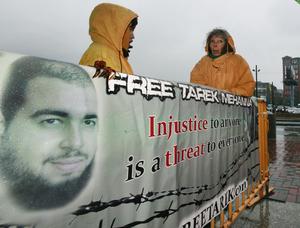
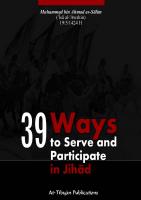
39 Ways To Limit Free Speech
39 Ways To Limit Free Speech is the title Law Professor David Cole’s recent article. Earlier this month, a 29-year old citizen from Sudbury, Massachusetts named Tarek Mehanna was sentenced to seventeen and a half years in prison for translating a document. The text he translated from Arabic is “39 Ways to Serve and Participate in Jihad” and its all over the internet, you can read it says David Cole, but don’t try to translate it. One issue in the government’s prosecution of this case is the use of the decision from the Brandenburg v. Ohio case in which the Supreme Court established that standard in ruling that the First Amendment protected a Ku Klux Klansman who made a speech to a Klan gathering advocating “revengeance” against blacks and “Jews.”
Professor David Cole:
- He was accused of providing material support to al-Qaeda by translating various documents and videos from Arabic into English. There’s no allegations that Mehanna ever met with or even talked to a member of al-Qaeda. There are no allegations that the translations were delivered to or provided to al-Qaeda which was the designated group.
- The government argued that because he translated these documents and put them up on the web and hoped to encourage people to support jihad and support al-Qaeda, that’s enough to constitute material support.
- Here’s an instant in which the government is prosecuting pure speech but no showing that the speech was connected to illegal conduct, no showing that it was intended to produce eminent lawless action, which the Supreme Court said is required to produce under Brandenburg.
- It’s enough that he put it up on the web and wanted to support al-Qaeda.
- If that’s a crime what about the New York Times when it does a report on one of the many messages Osama Bin Laden put after 9-11?
- I represented the Humanitarian Law Project in the case that went to the Supreme Court in 2010, in which the HLP was in engaging in advocacy of human rights and peace, clearly non-violent, non-criminal conduct.
- But because they wanted to do it to and with the Kurds in Turkey and particularly the political representatives of the Kurds in Turkey which is the Kurdistan Workers Party (designated as a terrorist organization) the government argued that it was a crime to teach the KWP to bring human rights claims in Geneva and work with them in peace overtures to the Turkish Government.
- The Supreme Court upheld that, but doesn’t apply to independent advocacy. (until now)
- Now if you wanted your speech to support terrorist organizations, even if you did it independently of that organization, even if you never met or talked to anyone in that organization, we can make it a crime.
- Very much about declaring a “new front” in the war on terror and the front is going after internet propaganda.
- To me it recalls the kind of aiding the enemy prosecutions we saw in World War 1.
- We as citizens need to be active in monitoring and pushing back against this material support statute.
Guest – Professor David Cole teaches constitutional law, national security, and criminal justice at Georgetown University Law Center. He is also a volunteer attorney for the Center for Constitutional Rights, the legal affairs correspondent for The Nation, a regular contributor to the New York Review of Books, and a commentator on National Public Radio’s All Things Considered. He has been published widely in law journals and the popular press, including the Yale Law Journal, California Law Review, Stanford Law Review, New York Times, Washington Post, Wall Street Journal, and Los Angeles Times.
——————-

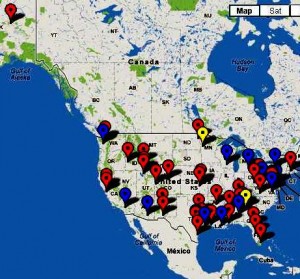
FAA Releases Lists of Drone Certificates—Many Questions Left Unanswered
Earlier this year we discussed the partnership with Cornell University and Technion-Israel Institute of Technology. The two institutions are working together to build a campus in New York City. Technion is involved with developing robotic weapons systems, which include aerial drones, and unmanned combat vehicle technology. There are many more universities involved with drone technology. Through a series of Freedom of Information requests by the Electronic Frontier Foundation, the FAA has been forced to reveal approximately 63 active drone sites. These sites are located in 20 states and their owners include military and universities. Universities include Cornell, (which we just mentioned) the University of Colorado, Georgia Tech, Eastern Gateway Community College and many more.
Attorney Jennifer Lynch:
- We filed a FOIA request with the FAA last April asking for copies of all the certificates of authorization and the special air-worthiness certificates that the FAA issues to anybody to wants to fly a drone in the US.
- We asked for these lists which are called COAs, or Certificates of Authorization. The COAs apply to public entities like state and local law enforcement, universities, the federal government.
- We got two lists from the FAA and the FAA says these cover all of the entities that applied for an authorization to fly a drone in United States.
- They’re very interesting, the COA list includes some unsurprising entities like DARPA, DHS, Customs and Border Protection, the FBI, various branches of the military. We already knew those entities were flying drones.
- What was more surprising was the number of universities and colleges on the list.
- Universities that have an aerospace engineering program they may be seeking authorization so the students can learn about and design drones.
- The Electronic Frontier Foundation is a civil liberties non-profit, we focus on civil liberties and new technology, and we’re concerned about surveillance equipment used by the government.
- Drones are a duel use technology, they can be used for good or for bad.
- They can see inside buildings, survey an area at night with heat sensors, they also have the ability to carry communications intercept tools. You could swap out various payloads on a drone.
- Then of course these drones can carry weapons.
- You can build your own drone, DIYDrones.
- We don’t know too much about what’s going on now. The reason the EFF file the FOIA request in the first place is that we just don’t know how agencies are using these drones.
- What we found is that a lot of the police forces that have drones are required to fly them under 600 feet. If its something that flying under 600 feet you’re going to be able to see that.
- Congress was getting a lot of pressure, and the FAA was getting a lot of pressure from state and local law enforcement, the military and the federal government to authorize more drones to be used in the United States.
- We’ve heard from the Congressional Research Service that 1 in 3 warplanes right now is a drone.
- The wars are going to end and the military is going to want to something with these drones.
Guest – Jennifer Lynch, staff attorney with the Electronic Frontier Foundation and works on open government, transparency and privacy issues as part of EFF’s FOIA Litigation for Accountable Government (FLAG) Project. In addition to government transparency, Jennifer has written and spoken frequently on government surveillance programs, intelligence community misconduct, and biometrics collection. Prior to joining EFF, Jennifer was the Clinical Teaching Fellow with the Samuelson Law, Technology & Public Policy Clinic at UC Berkeley School of Law. At the Samuelson Clinic, Jennifer specialized in privacy and intellectual property issues, including investigations on social media, privacy and the smart electrical grid, digital books, and open source regimes for biotech. Before the Clinic, Jennifer practiced with Bingham McCutchen in San Francisco and clerked for Judge A. Howard Matz in the Central District of California. She earned both her undergraduate and law degrees from UC Berkeley.
—————————–
Afghanistan War, Civil Liberties, Criminalizing Dissent, FBI Intrusion, Human Rights, Prison Industry, Supreme Court, Surveillance, Targeting Muslims
Podcast: Play in new window | Download
Updates:
——
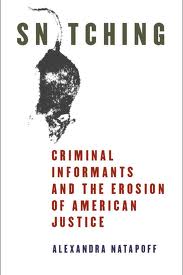
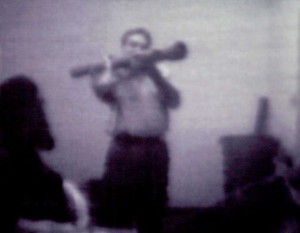
Snitching: Criminal Informants and the Erosion of American Justice
The FBI now spends more than 3 billion dollars a year on counter-terrorism, the bureau maintains a team of 15 thousand spies in a nationwide network of informants. Criminal informants or snitches are part of a criminal system most people know little about. Many of these informants are tasked with infiltrating Muslims communities in the United States. We’ve discussed in the past, the expanded FBI guidelines plus the broad over reaching powers and underhanded tactics the FBI use when targeting Mosques and Muslim Americans.
We talk today with Professor of Law and author Alexandra Natapoff, about her book Snitching: Criminal Informants and the Erosion of American Justice. Her book catalogues the downside in the use of snitches on social structure and democracy and suggests ways to make the use of informants acceptable within the criminal justice system.
Professor Alexandra Natapoff:
- Snitching is such a massive part of our criminal justice system even though the public rarely gets a good look at it.
- It’s an under the radar aspect of the way our criminal justice system handles investigations, the way it handles cases, the way it shapes our case law.
- It’s such a powerful deal, a deal that exerts a huge amount of influence and plea bargaining.
- The reality is that this is a deeply under-regulated arena. The handler is the law enforcement official who creates and uses an informant.
- It could be a police officer talking to a street corner addict cutting a deal right then and there.
- It could be an FBI agent who has an established documented supervised relationship with a long term criminal informant.
- Somebody may be suspected of a crime or even just of interest to the government. People who have mild brushes with the criminal system can end up through this mechanism of criminal informing entering into a world in which really anything can happen to them.
- Argument: Either you let us use informants in an unaccountable, invisible, secretive, undocumented way or we can’t run the criminal system at all.
- We permit the barter of crime under the radar, in a way that is unfair to other defendants and other suspects. We produce unreliable information through the use of informants without regulation.
- My contention is that we shouldn’t ban this practice, but run it as any other public policy with transparency and accountability and some rules.
- My favorite criminal informant of recent is Jack Abramoff.
- Usually we don’t learn when informants have been mistreated because often they have very little power.
- The courts have said, informants proceed at their own risk.
- This is a deal that they can enter if they want to risk their life.
- The law does not owe criminal informants much protection. Our criminal system is built on the principle that the defendant should not have to face the government unaided by council.
- That’s a principle that should be extended to criminal informants.
- The state of Florida passed a ground breaking law, called Rachel’s Law.
- What sort of deal should we permit the government to cut with informants?
- The use of criminal informants is a massive source of error in capitol cases.
- States across the country are starting to impose greater restrictions on the use of criminal informants, in particular jailhouse snitches as a way to improving reliability of the information.
- Confidential Informant Accountability Act – Federal Legislative Proposal
- One of the things the government doesn’t keep track of is how many crimes are committed by criminal informants in the pursuit of investigating new cases.
Guest – Alexandra Napatoff, professor of Law at Loyola Law School, Los Angeles, and a member of the American Law Institute. I have also been a federal public defender, a community organizer, and the recipient of an Open Society Institute Community Fellowship.
————–


It Started in Wisconsin: Dispatches from the Front Lines of the New Labor Protest
Remember the multi-day occupation of the Wisconsin State Capitol by tens of thousands of people. Massive demonstrations erupted when the Republican controlled state government proposed to dismantle public employee bargaining rights as Wisconsin trade unions already conceded to wage and benefit cuts. These protests became the largest labor demonstrations in modern American history. Protesters from the Middle East sent pizzas and solidarity as thousands occupied Madison’s Capitol building.
We’re joined today by Paul Buhle, historian, and editor of the book It Started in Wisconsin: Dispatches from the Front Lines of the New Labor Protest. A powerful collecton of eyewitness reports and essays by striking teachers, students, and many others. This book exposes the corporate agenda that imposed anti-union legislation across the country and highlights the power of the people coming together in protest.
Paul Buhle:
- Brecht Forum, Friday night – April 27,2012
- The “it” is very large, perhaps vaporous and very promising. We were thinking of occupy in the sense that Madisonians, labor supporters from as far away as California, occupied the State Capitol, the rotunda in February of last year and remained there for some weeks.
- The “it” may mean occupy or the emergence of a new kind of movement.
- We should have seen it coming but we were deluded or Walker, when running for election never mentioned these promises or threats at all and made some statements about getting along with unions when he was a county executive.
- The response was just as stunning as the shock. A mass outpouring that really began with students in Stoten, an old Norwegian community about half an hour south of Madison – working up their own protests with facebook to support their teachers.
- And then, the following weeks, a massive outpouring of people around the Capitol and then occupying the Capitol.
- Things went on and on until there were crowds of 150 thousand in a town of Madison that has normally only 250 thousand residents.
- Pacifica has been in the business from the late 1940s in the Bay area, in providing the documentation that other commercial radio stations rarely provide.
- I would say these protests in Wisconsin are probably the most recorded mass movement of the Left in recent history.
- Among the most important developments, relative to the stories in the history of labor, the unions of public workers are substantially, if not overwhelmingly women.
- So, the shape of the movement, perhaps its cultural character, perhaps the infernal degree of politeness that outsiders frequently complained about, the chant – let us in, let us in please.
- What it demonstrated was that women in the labor movement were ferociously militant.
- My assessment was that the labor movement was in no way prepared to stage a general strike.
- Nor that a massive walk out of public workers mean that the wheels of industry would stop what few wheels are left.
- The sense that public workers wish to put pressure on the political system.
- Contrary to our expectations of the Democratic Party in general, assorted leaders, were quite wonderful in their constituencies and the things that they did, and how they related to the movements.
- As an editor and producer of radical comics, I’m always interested in new developments in the field, and its exciting there are young comic artists who are working in and around “occupy.”
Guest – Paul Buhle, senior lecturer at Brown University, a historian of American radicalism., a former member of Students for a Democratic Society and author of many books including images of American Radicalism. Also, Che, A Graphic Biography, and Isodore Duncan, a graphic biography by Sabrina Jones.
———–


May Day: Workers’ Rights and Immigrant Communities
In the past year, public employees around the country have rallied to hold on to their collective bargaining, workers rights and pensions. May Day protests this year will emphasize these issues and will be especially significant for immigrant rights in California that directly effect certain communities. On May Day in 2006, hundreds of thousands took to the streets of San Jose marking one of the largest demonstrations in California history.
Guest – Celina Benitez, director of the Committee In Solidarity With the People of El Salvador, Celina is also with the Southern California Immigration Coalition and produces radio for Suplemento Comunitario on sister station KPFK in Los Angeles.
——————————————————-
Civil Liberties, Habeas Corpus, Human Rights, Prison Industry, Surveillance, Targeting Muslims, Torture, Truth to Power
Podcast: Play in new window | Download
Updates:
—-
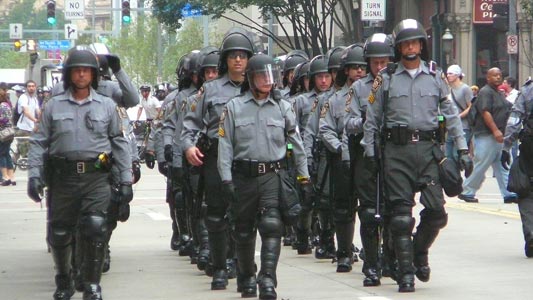

National Defense Authorization Act Update
Co-host Michael Ratner expounds on National Defense Authorization Act. The Act has passed both houses, despite Obama threatening to veto the Act. Obama thought that various provisions of the National Defense Authorization Act concerning detentions, might impinge on his authority as the executive. Obama was more concerned about Congress telling the President how to treat those captured or kidnapped in “war on terror.”
—-
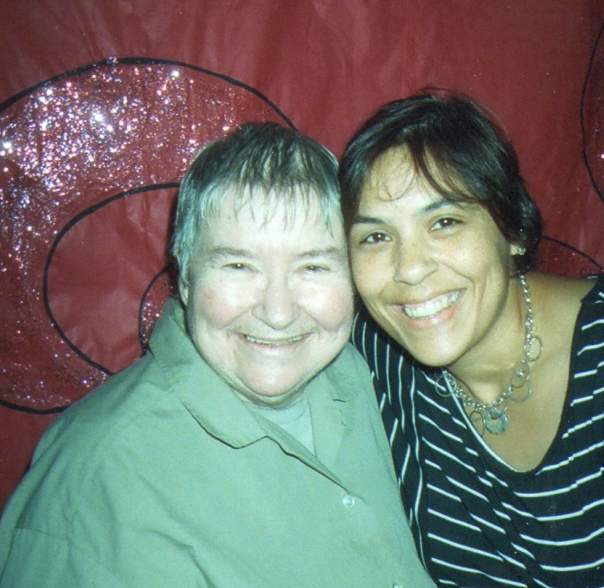

UPDATE: Political Prisoner Lynne Stewart
Political prisoner and good friend, Lynne Stewart continues to uplift people around her while serving a 10 year sentence at the Federal Medical Center in Fort Worth Texas. Lynne, as many listeners know, was prosecuted for representing her client the blind Egyptian Sheik, Omar Abdel Rahman. In trying to negotiate a return to Egypt out of solitary confinement, she made a press release public. She was tried and found guilty for materially aiding “terrorism.” She received a 2 and half year sentence, instead of 30 years that the government wanted. Then, the Second Circuit Court sent the case back to the Judge. Judge John G Koeltl sentenced defendant, Lynne Stewart: 120 months incarceration on five counts to be served concurrently. Lynne Stewart is now 72 years old, she’s a breast cancer survivor with other pending health issues. She’s called them the usual brush fires of aging, yet many are concerned. SAVE THE DATE FEBRUARY 28-29
Ralph Poynter:
- She is looking forward to her attorney Herald Price Fahringer to presenting to the court once again testing the law. We are planning a Occupy the Court Room and the park, the night before on February 28 through to the 29.
- The lawyer will be talking about the laws used to extend Lynne’s sentence. He said any lawyer that wouldn’t want this case, doesn’t understand law. He looked forward to doing it. He went for a one hour visit with Lynne at MCC and stayed all day.
- No matter what happens, Lynne will continue to fight for her license.
- She’s is Federal Medical Center in Fort Worth, Texas. Big airbase there. It’s an enormous prison, but she’s in the hospital ward.
- Even though I’d been on the list visiting her (in New York prison) I was not on the list (Texas prison)
- I just went down there, and she said, you’re not on the list but I’m going to go to floor supervisor and she says, you just come.
- That Saturday morning I was in front of the prison and they told me I was not eligible to go in. They said it was like an airbase, so I walked outside the gate and stood there. The guard came over and said what are doing here? I said, I’m waiting.
- Around 10:30 an official car came down and said you’re denied admission.
- I said, I understand, but I’m going to wait.
- Around Noon, the woman came back and she says, fill out an application.
- She said I knew if you fought from the outside I was going to fight from the inside and it only took 4 hours.
- You can’t imagine after sleeping on a 2 inch exercise mat on a steel platform for a year, and they showed me the hospital bed.
- She is Miss S, in the prison. Everybody brings her their papers.
- She heard noise outside her room at 5 o’clock in the morning, they were lined up some with papers stacked 3 feet high.
- There is an oxymoron – prison health care. There is no such thing.
- She’s lost about 45 pounds.
- She’s very sick, she can’t sit down. In the visiting room she has to sit sideways.
- Thanks again for all of the people sending bucks for me to go see Lynne.
- Write her a letter. The letters pick her up.
- They gave her medicine and she couldn’t get out of bed. We have a system now when they give her medicine she calls me up. I call my daughter the doctor and she tells me whether Lynne should take it or not take it.
Guest – Ralph Poynter, Lynne’s husband, father, activist. Please write to Lynne Stewart – LYNNE STEWART / 53504-054 FMC CARSWELL / FEDERAL MEDICAL CENTER / P.O. BOX 27137 / FORT WORTH, TX 76127
—–
Photo by flickr user G20Voice




























